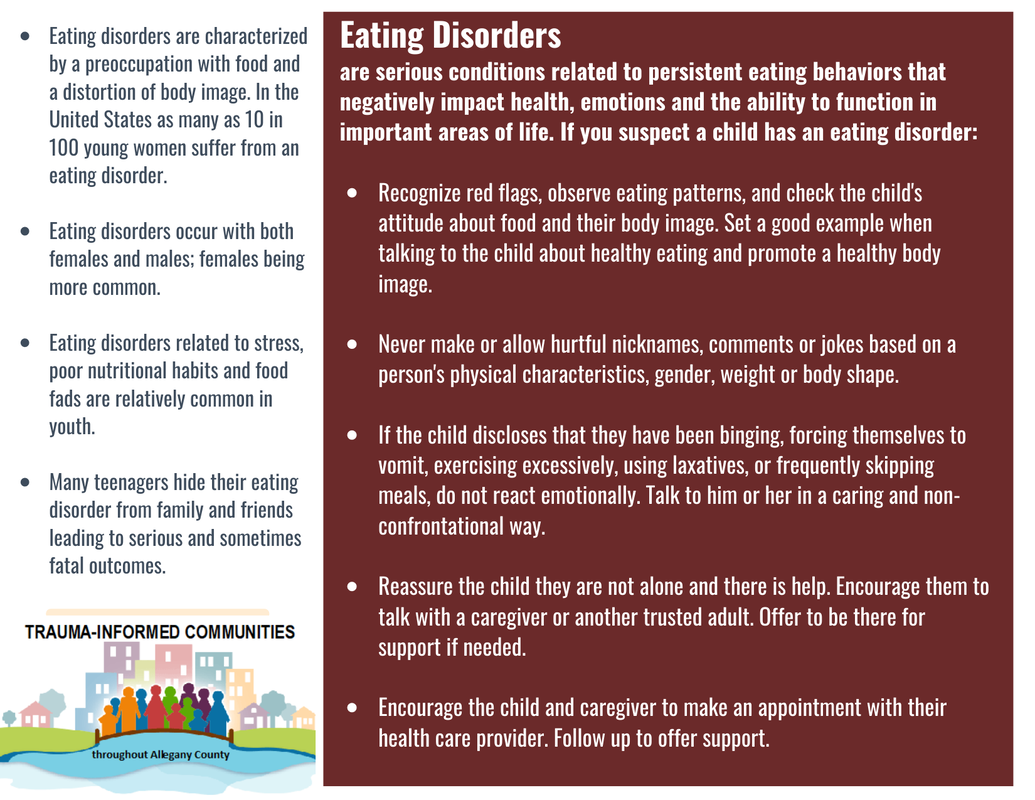- Home
- Trauma-Informed Education
- Trauma Overview
-
#onecaringadult
- #Onecaringadult Allegany County App
- #onecaringadult- Academic Stress
- #onecaringadult- Alcohol and Other Drugs
- #onecaringadult- Bullying
- #onecaringadult- LGBTQ+
- #onecaringadult- Childhood Neglect
- #onecaringadult- E-Cigarettes and Vaping
- #onecaringadult- Eating Disorders
- #onecaringadult- Mental Health
- #onecaringadult- Online Sexual Exploitation
- #onecaringadult- Non-Suicidal Self-Injury
- #onecaringadult- Sexual Abuse
- #onecaringadult- Sexually Transmitted Infections
- #onecaringadult- Suicide Prevention
- #onecaringadult- Teen Dating Violence
- #onecaringadult- Teen Pregnancy
- #onecaringadult- Toxic Stress
- #onecaringadult- Vaping & E-Cigarettes
- #onecaringfriend
- Trauma-Informed Resources
Eating disorders are serious conditions related to persistent eating behaviors that negatively impact health, emotions and the ability to function in important areas of life. The most common eating disorders are anorexia nervosa, bulimia nervosa and binge-eating disorder. While the exact cause of eating disorders is unknown, certain factors might be involved, including:
- Biology. People with first-degree relatives (siblings or parents) with an eating disorder may be more likely to develop an eating disorder, suggesting a possible genetic link.
- Psychological and emotional issues. Psychological and emotional problems, such as depression or anxiety disorders, are closely linked with eating disorders.
- Environmental. Modern Western culture emphasizes thinness.
- Favorite activities. Participation in activities that value leanness, such as ballet, or sports in which scoring is partly subjective, such as skating, can play a role.
What You Need To Know
|
Recognizing Eating Disorders
Signs and symptoms vary, depending on the type of eating disorder. Be alert for eating patterns and beliefs that might signal unhealthy behavior. Some red flags that might indicate an eating disorder include:
Tips for Helping
Parents, relatives, friends, and other caring adults can help a child or teen who is showing signs of an eating disorder. It is important to take these 4 steps if you have concerns:
Notice
Pay attention to warning signs of eating disorders, including changes in behaviors around food, physical changes, types of social media use, and conversations about food or body image. Listen
Listen openly, reflectively, and without judgment. If you do not understand, ask how your child is feeling and how you can best support them. Validate their feelings instead of immediately offering solutions. Learn
Learn more about eating disorders and recovery, including facts and myths. Reading about or speaking with other parents who have supported their children in recovery is also helpful and is often a part of treatment programs. Support
Remind them that you are there to support them and just want them to be well. Focus on positive personality traits and emotional health instead of exclusively focusing on food-related behavior. Model recovery in your own relationship with food, weight, and exercise, and work to create an environment where the whole family is promoting healthy behaviors and alternatives. Source: Mental Health America
|
Learn More About Eating Disorders
Helpful Links
|
- Home
- Trauma-Informed Education
- Trauma Overview
-
#onecaringadult
- #Onecaringadult Allegany County App
- #onecaringadult- Academic Stress
- #onecaringadult- Alcohol and Other Drugs
- #onecaringadult- Bullying
- #onecaringadult- LGBTQ+
- #onecaringadult- Childhood Neglect
- #onecaringadult- E-Cigarettes and Vaping
- #onecaringadult- Eating Disorders
- #onecaringadult- Mental Health
- #onecaringadult- Online Sexual Exploitation
- #onecaringadult- Non-Suicidal Self-Injury
- #onecaringadult- Sexual Abuse
- #onecaringadult- Sexually Transmitted Infections
- #onecaringadult- Suicide Prevention
- #onecaringadult- Teen Dating Violence
- #onecaringadult- Teen Pregnancy
- #onecaringadult- Toxic Stress
- #onecaringadult- Vaping & E-Cigarettes
- #onecaringfriend
- Trauma-Informed Resources
